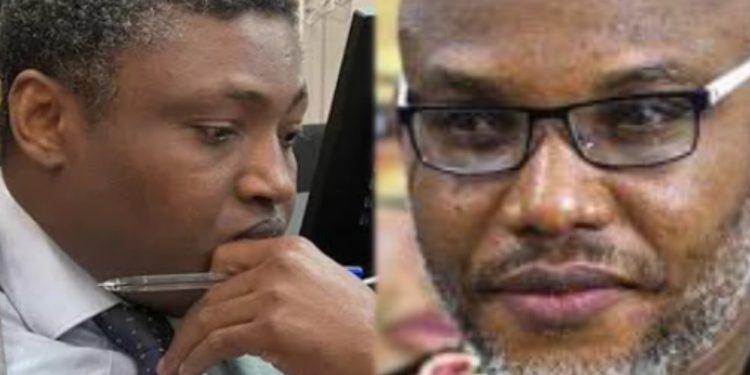The recent conviction of Simon Ekpa, a self-acclaimed Prime Minister of Biafra, by a Finnish court has reignited debates about the inefficiencies in Nigeria’s criminal justice system. Human rights lawyer and activist, Maduabuchi Idam, has described the swift conclusion of Ekpa’s terrorism case in Finland as a direct indictment of Nigeria’s slow and often politicized judicial process.
On Monday, the Päijät-Häme District Court in Finland sentenced Ekpa to six years imprisonment after finding him guilty of terrorism-related offences. Finnish authorities had arrested him in November 2024 following an investigation by the country’s National Bureau of Investigation. The probe linked him to incitement of violence and terrorism, largely through his social media broadcasts that were said to have contributed to unrest and insecurity in Nigeria’s Southeast region.
‘Finland Exposed Nigeria’s Judiciary’ – Idam
Reacting to the development, Idam noted that the most striking aspect of the case was not the conviction itself but the speed with which the Finnish judiciary delivered justice. According to him, securing a verdict in less than one year showed a level of efficiency and seriousness lacking in Nigeria’s legal system.
“Securing a verdict in Simon Ekpa’s case in less than a year is more of interest to me than the conviction itself. The expeditious conclusion of Ekpa’s case by the Finnish court has exposed Nigeria’s criminal justice system to scorn, mockery, and dishonor before the international community,” Idam said in a statement.
He urged the Federal Government not to gloat over Ekpa’s imprisonment but to instead use the moment as an opportunity to reflect on judicial reforms that would restore public confidence and improve Nigeria’s image globally.
Call for Nnamdi Kanu’s Release
Idam also used the occasion to renew calls for the release of Nnamdi Kanu, leader of the Indigenous People of Biafra (IPOB), who has been in detention since 2021. Kanu faces multiple charges, including treasonable felony, after being re-arrested and extradited to Nigeria from Kenya. His trial has dragged on for years, with several adjournments and legal battles over his continued detention.
The activist lawyer argued that Ekpa’s conviction should not influence the government’s position on Kanu, stressing that releasing the IPOB leader would serve as a more constructive and peace-driven step toward resolving the unrest in the Southeast.
“Rather than gloat over Ekpa’s conviction, the government should seize the moment to reflect on its judicial practices and consider the release of Mr. Kanu as the most peaceable option for the Southeast, especially at this crucial time,” Idam said.
Ekpa, Kanu, and the Southeast Question
Simon Ekpa, who has long described himself as Kanu’s disciple, rose to prominence after Kanu’s arrest. From Finland, Ekpa allegedly issued directives for sit-at-home orders in the Southeast, actions that often paralyzed economic activities and triggered violence. His broadcasts on social media platforms were repeatedly cited by security agencies as a major factor fueling insecurity in the region.
In contrast, many observers argue that Kanu’s detention without speedy trial has worsened tensions in the Southeast. While IPOB insists it is a non-violent movement for self-determination, Nigerian authorities have proscribed it as a terrorist organization, linking it to attacks on security formations and public institutions.
Nigeria’s Troubled Justice System
The comparison between Finland’s quick handling of Ekpa’s case and Nigeria’s drawn-out trials has once again brought attention to the challenges facing the Nigerian judiciary. Cases often linger in courts for years due to adjournments, political interference, lack of adequate funding, and corruption.
Legal experts believe that the delay in high-profile cases erodes public trust in the system and creates room for political manipulation. Idam’s remarks echo a wider sentiment that Nigeria must urgently reform its judicial system to guarantee fairness, timeliness, and independence.
Broader Implications
Ekpa’s conviction is already being interpreted in different ways within Nigeria’s political and legal circles. For some, it is proof that foreign jurisdictions are taking allegations of terrorism seriously, while for others, it underscores how Nigeria lags behind in matters of justice delivery.
As the debate continues, Idam’s call for Kanu’s release adds a new dimension to discussions about peace and stability in the Southeast. Whether the Federal Government will heed the advice remains uncertain, but what is clear is that Simon Ekpa’s conviction abroad has once again turned the spotlight on Nigeria’s struggling judicial system.


